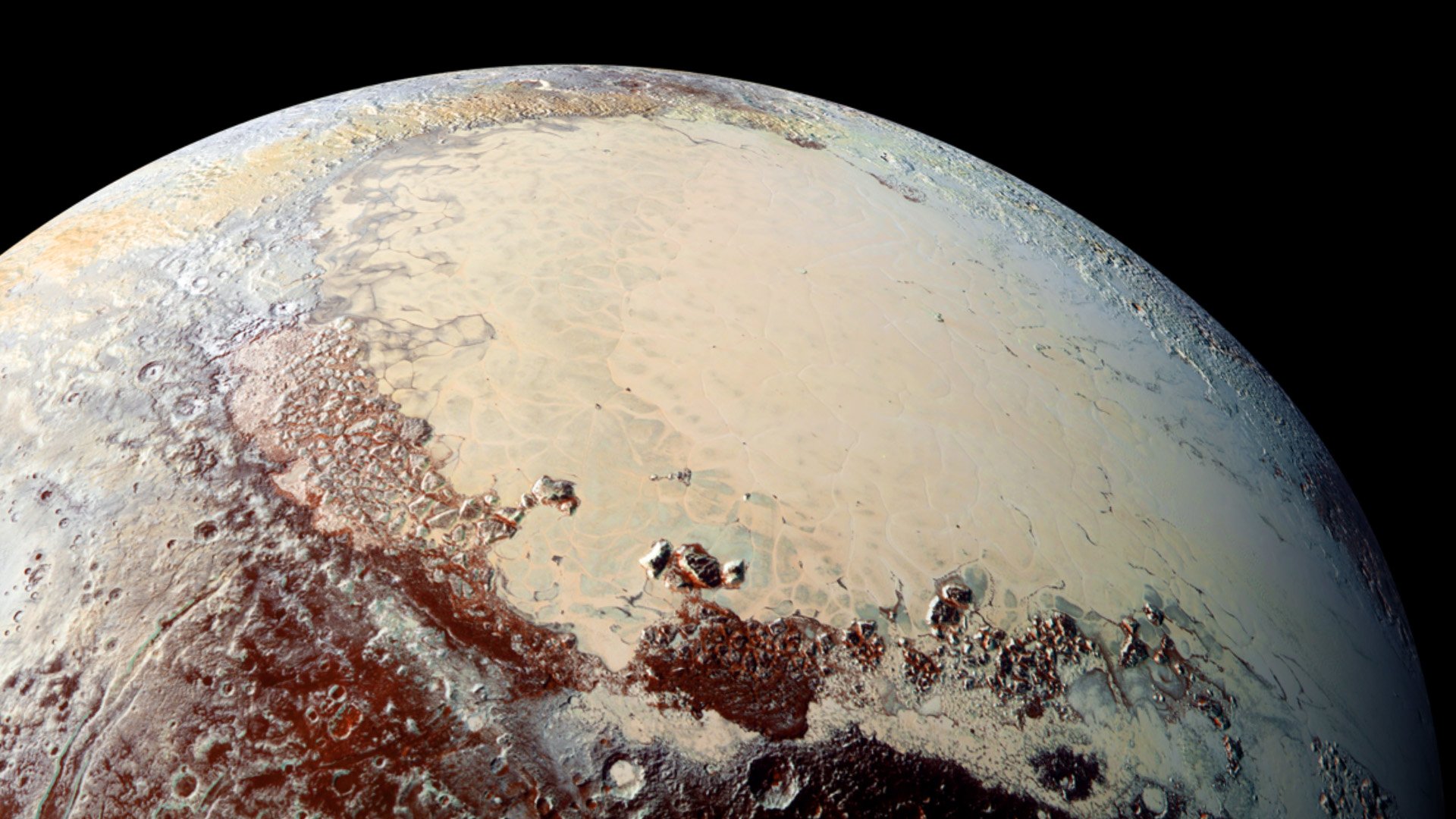Science
NASA’s New Horizons Inspires New Novel on Pluto’s Mysteries

NASA’s New Horizons mission has fundamentally changed our understanding of Pluto, prompting not only scientific revisions but also inspiring a new novel by space scientist and author Les Johnson. The book, titled “Pluto,” serves as the concluding installment of the late Ben Bova‘s Grand Tour series, which explores human interactions within our solar system.
After Bova passed away in 2020, Johnson was entrusted with turning the notes left behind into a narrative set on Pluto. Initially, Bova’s vision depicted a rocky world with little ice. However, upon reviewing these notes, Johnson consulted with Alan Stern, the principal investigator of the New Horizons mission. Stern’s feedback was clear: “We never found anything on Pluto that was anything like that,” Johnson recounted in a recent episode of the Fiction Science podcast. This prompted Johnson to delve deeper into the scientific realities of Pluto’s landscape.
The resulting novel provides vivid descriptions of Pluto’s environment, including the orange-tinged ice sheet of Sputnik Planitia and the dark markings on Charon, Pluto’s largest moon. Drawing from his extensive background as a NASA researcher and author of both fiction and nonfiction, Johnson created a storyline that reflects the complex interplay of science and speculation.
Set in the 22nd century, “Pluto” imagines a future where humans begin to merge with machines and receive data from distant worlds like Proxima Centauri b. The plot ignites when scientists uncover an alien artifact beneath the icy surface of Sputnik Planitia, setting off a chain of events involving military leaders and scientists from the U.S. Space Force, China, and Russia. Amidst the geopolitical drama, a romantic subplot develops between two protagonists, adding layers of human emotion to the narrative.
Johnson emphasizes that while Pluto’s harsh environment serves as the story’s backdrop, deeper themes emerge about humanity’s nature during space exploration. He notes, “As we expand into the solar system, we won’t necessarily be leaving our humanity behind.” The mix of personal rivalries, tragedies, and temptations will accompany those who venture into space.
Looking ahead, Johnson anticipates that military fleets like the Space Force will play significant roles in future explorations. “I envision it’ll still be around,” he states, indicating that nations such as China and Russia will also be key players in space endeavors.
The novel also grapples with contemporary issues projected into the future. For instance, one character experiences a traumatic accident and has their brain merged with artificial intelligence, raising ethical questions about identity and humanity. Johnson warns that such advancements could lead to a utilitarian approach in decision-making, potentially overshadowing compassion.
Another relevant theme is the issue of virtual reality addiction, which mirrors current societal concerns. Johnson expresses alarm at how young individuals, particularly young men, are increasingly drawn to online gaming, detracting from real-world experiences.
In a lighter note, when asked about the debate surrounding Pluto’s classification as a planet, Johnson expresses comfort with the term “dwarf planet.” He explains, “It’s just a matter of nomenclature for me,” acknowledging the discovery of numerous similar objects in the Kuiper Belt.
Ultimately, Johnson hopes that “Pluto” will inspire readers to contemplate the universe’s mysteries. “I want readers to finish the book and think, ‘Wow, what is out there?’” he asserts. His passion for space exploration shines through, encouraging readers to advocate for continued funding and research.
Les Johnson, who recently retired as chief technologist at NASA’s Marshall Space Flight Center, continues to engage with the space sector as CEO of Infinite Frontiers Consulting. His latest science fiction novel, “Crisis at Proxima,” co-written with Travis S. Taylor, has recently been released in paperback. He is also working on a new novel titled “Monster Hunter: The Alien Files,” in collaboration with Larry Correia, alongside an upcoming nonfiction book focused on space exploration.
For those interested in the intersection of science and storytelling, the Fiction Science podcast is an engaging resource, highlighting various aspects of science fiction and its implications for our understanding of space. Future episodes are available on platforms like Apple, Spotify, and Podchaser, providing a rich exploration of the genre.
-

 Lifestyle3 months ago
Lifestyle3 months agoLibraries Challenge Rising E-Book Costs Amid Growing Demand
-

 Sports3 months ago
Sports3 months agoTyreek Hill Responds to Tua Tagovailoa’s Comments on Team Dynamics
-

 Sports3 months ago
Sports3 months agoLiverpool Secures Agreement to Sign Young Striker Will Wright
-

 Lifestyle3 months ago
Lifestyle3 months agoSave Your Split Tomatoes: Expert Tips for Gardeners
-

 Lifestyle3 months ago
Lifestyle3 months agoPrincess Beatrice’s Daughter Athena Joins Siblings at London Parade
-

 World3 months ago
World3 months agoWinter Storms Lash New South Wales with Snow, Flood Risks
-

 Science3 months ago
Science3 months agoTrump Administration Moves to Repeal Key Climate Regulation
-

 Business3 months ago
Business3 months agoSoFi Technologies Shares Slip 2% Following Insider Stock Sale
-

 Science2 months ago
Science2 months agoSan Francisco Hosts Unique Contest to Identify “Performative Males”
-

 Science3 months ago
Science3 months agoNew Tool Reveals Link Between Horse Coat Condition and Parasites
-

 Sports3 months ago
Sports3 months agoElon Musk Sculpture Travels From Utah to Yosemite National Park
-

 Science3 months ago
Science3 months agoNew Study Confirms Humans Transported Stonehenge Bluestones









